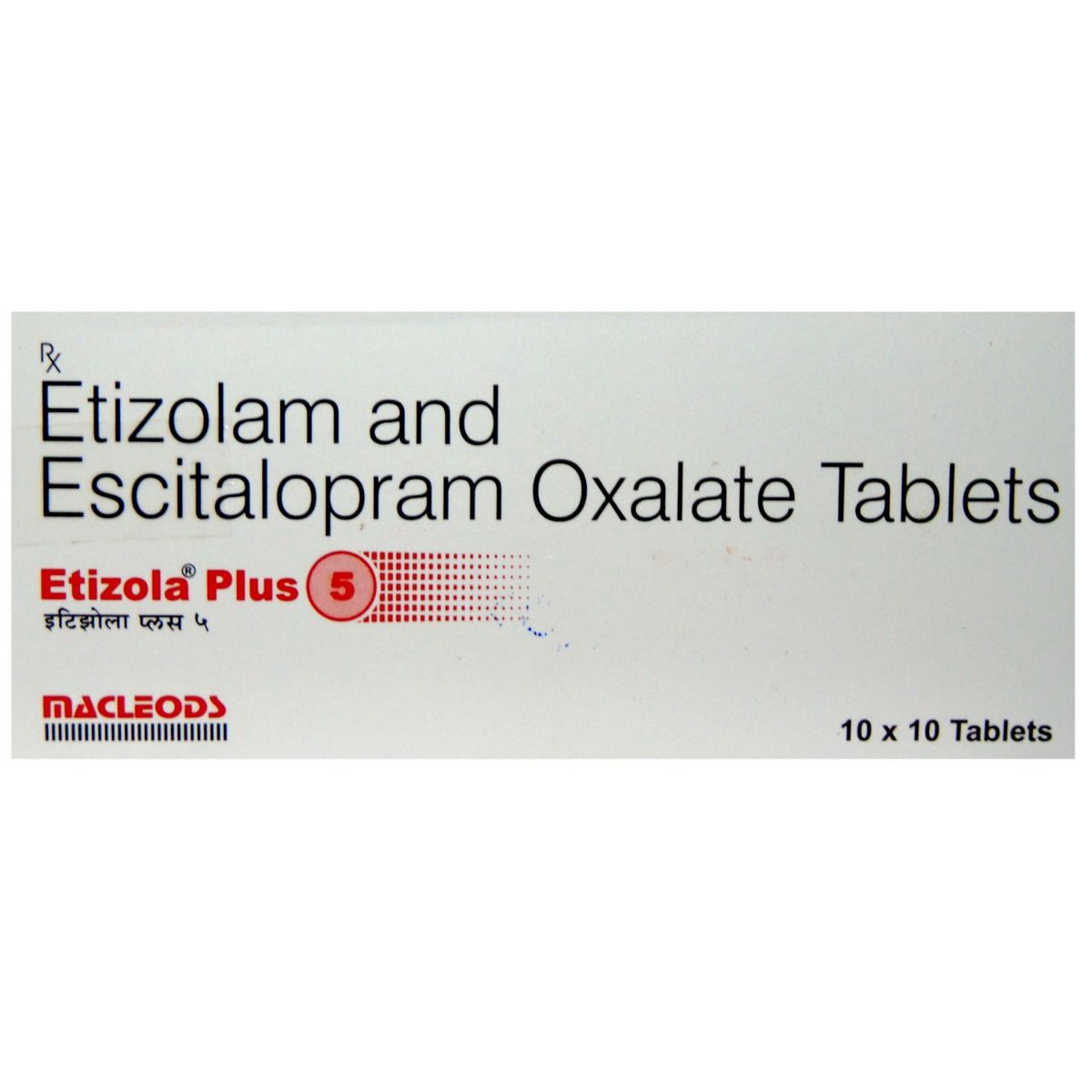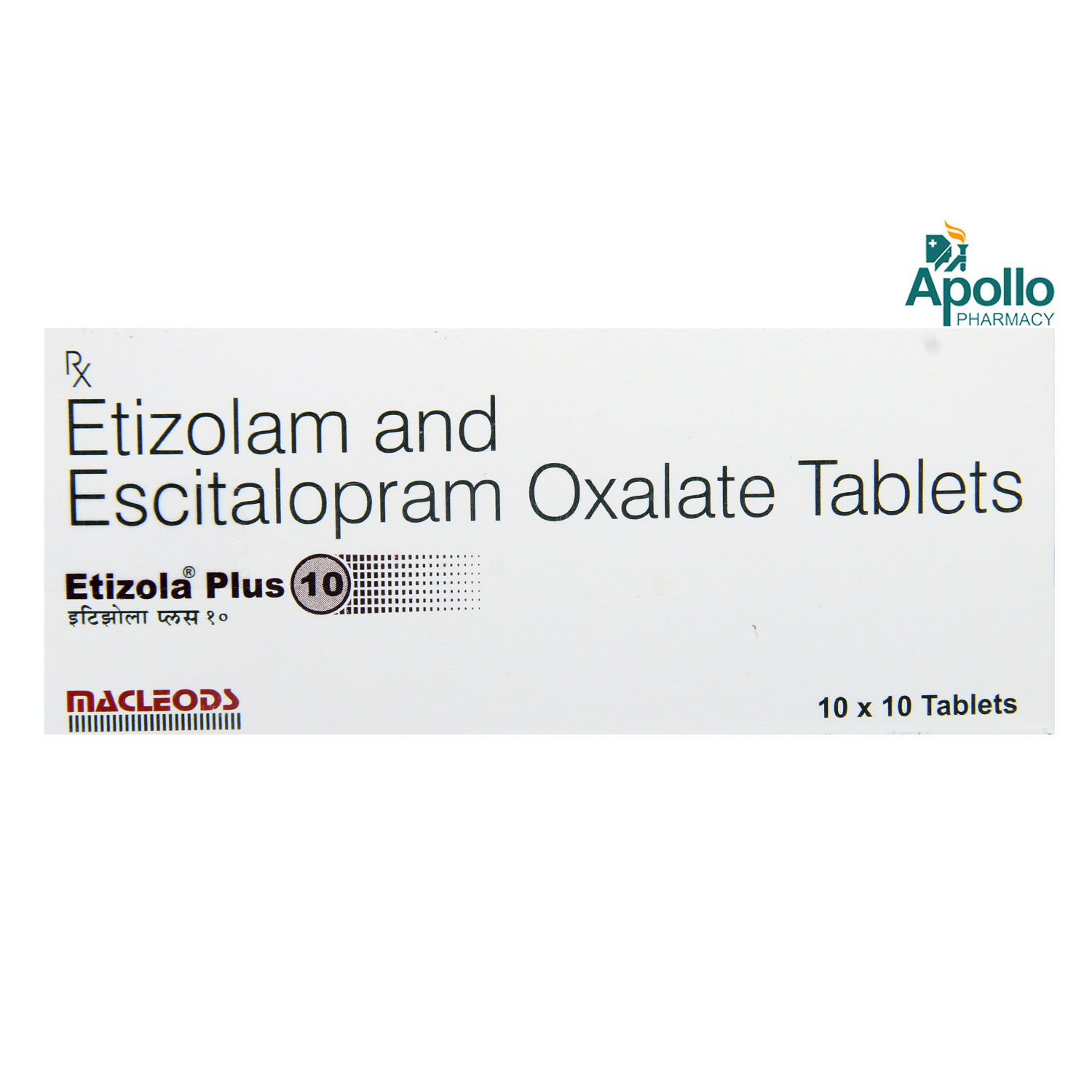Etizolam+escitalopram
About Etizolam+escitalopram
Etizolam+escitalopram comes into the category of medicines known as 'antidepressants', primarily used to treat depression and other mental health conditions, including anxiety, panic disorder, and obsessive-compulsive disorder. Depression is a mood disorder that affects day to day life of a person. A person may have symptoms such as feeling sad or feeling lost and might have mood swings. Anxiety is defined as an emotion characterized by feelings of tension, worried thoughts, and symptoms like increased blood pressure. Anxiety disorder also includes panic disorder which is characterized by sudden feelings of terror. In Obsessive-compulsive disorder (OCD), a person feels the need to think or perform things repeatedly.
Etizolam+escitalopram compromises of two medicines, namely: Escitalopram and Etizolam. Escitalopram comes into the category of medications known as 'selective serotonin reuptake inhibitors, or SSRIs', and works by increasing serotonin levels. Serotonin is a chemical messenger in the brain responsible for improving mood and physical symptoms of depression. It is also responsible for relieving symptoms of anxiety, panic attacks, and obsessive-compulsive disorders. Etizolam comes into the category of 'benzodiazepine (BDZ)', which works by increasing the activity of GABA (a chemical messenger in the brain that acts as a natural nerve-calming agent) and is involved in inducing sleep. Thereby, Etizolam+escitalopram relaxes muscles, reduces anxiety, and helps to fall asleep.
You can take Etizolam+escitalopram with or without food. It should be swallowed whole with a glass of water. Do not chew, bite, or break it. Your doctor will advise you on how often you take your tablets based on your medical condition. In some cases, you may experience decreased or increased appetite, weight gain, pain, sweating, fatigue, or high fever. Most of these side effects of Etizolam+escitalopram do not require medical attention and gradually resolve over time. However, if the side effects are persistent, reach out to your doctor.
Try not to stop taking Etizolam+escitalopram of your own, as it may lead to unpleasant side effects. Let your doctor know about this, as it may cause withdrawal symptoms. Do not take Etizolam+escitalopram if you have epilepsy (seizure disorder or fits), diabetes, sexual disorders, liver or kidney disease, any heart problems, bleeding or clotting disorders, or are currently taking medicines for depression known as MAO inhibitors (such as Isocarboxazid, Phenelzine, Selegiline), or problems with alcohol or other prescription drugs. Inform your doctor if you are allergic to Etizolam+escitalopram.
Uses of Etizolam+escitalopram
Medicinal Benefits
Etizolam+escitalopram compromises of two medicines, namely: Escitalopram and Etizolam. Escitalopram comes into the category of medications known as 'selective serotonin reuptake inhibitors, or SSRIs', and works by increasing serotonin levels. Serotonin is a chemical messenger in the brain responsible for improving mood and physical symptoms of depression. It is also responsible for relieving symptoms of anxiety, panic attacks, and obsessive-compulsive disorders. Etizolam comes into the category of 'benzodiazepine (BDZ)', which works by increasing the activity of GABA (a chemical messenger in the brain that acts as a natural nerve-calming agent) and is involved in inducing sleep. Thereby, Etizolam+escitalopram relaxes muscles, reduces anxiety, and helps to fall asleep. Both, in combination, provide overcoming depression.
Directions for Use
Storage
Side Effects of Etizolam+escitalopram
- Headache
- Anxiety
- Dizziness
- Yawning
- Tremors
- Restlessness
- Feeling sleepy
- Feeling sick (nausea)
- Abnormal dreams
- Difficulties falling asleep
- Blocked or runny nose (sinusitis)
- Increased or decreased appetite
- A decreased or increased appetite
Patients Concern
Disease/Condition Glossary
Depression: It is a mood disorder that affects day to day life of a person. A person may have symptoms such as feeling sad or feeling of lost and might have mood swings. Conditions that may worsen in persons facing depression include arthritis, asthma, cardiovascular disease, cancer, diabetes and obesity.
Anxiety: It is defined as an emotion characterized by feelings of tension, worried thoughts, and symptoms like increased blood pressure. Anxiety disorder also includes panic disorder which is characterized by sudden feelings of terror.
Obsessive-compulsive disorder (OCD): In this disorder, a person feels the need to think or perform things repeatedly.
FAQs
Etizolam+escitalopram compromises of two medicines, namely: Escitalopram and Etizolam. Escitalopram comes into the category of medications known as 'selective serotonin reuptake inhibitors, or SSRIs', and works by increasing serotonin levels. Serotonin is a chemical messenger in the brain responsible for improving mood and physical symptoms of depression. It is also responsible for relieving symptoms of anxiety, panic attacks, and obsessive-compulsive disorders. Etizolam comes into the category of 'benzodiazepine (BDZ)', which works by increasing the activity of GABA (a chemical messenger in the brain that acts as a natural nerve-calming agent) and is involved in inducing sleep. Thereby, Etizolam+escitalopram relaxes muscles, reduces anxiety, and helps to fall asleep.
$nme does not affect any contraception, including emergency pills or combined pill.
It takes about 2-4 weeks before you start feeling better. It is advised not to stop this medicine without consulting your doctor as may lead to unpleasant side-effects.
Etizolam+escitalopram is not advised in cases if a person is allergic to Etizolam+escitalopram, has epilepsy (seizure disorder or fits), diabetes, sexual disorders, liver or kidney disease, any heart problems, bleeding or clotting disorders, or are currently taking medicines for depression known as MAO inhibitors (such as Isocarboxazid, Phenelzine, Selegiline), or problems with alcohol or other prescription drugs. It should not be given to a person having a low heart rate along with symptoms of diarrhoea and vomiting, pregnant women, trying to get pregnant, breastfeeding, having eye problems such as glaucoma. In diabetics, it can cause difficulty in keeping stable blood sugar levels.
Certain side-effects of Etizolam+escitalopram can be dealt with simple tips such as if you experience dry mouth, you can chew sugar-free gum or take sugar-free sweets. If you are sweating a lot while taking Etizolam+escitalopram, wear loose clothing, and use a strong antiperspirant. If you cannot sleep after taking Etizolam+escitalopram, prefer to take it in the morning to avoid sleep disturbances. If you feel sleepy after taking Etizolam+escitalopram, avoid taking it in the evening and limit your alcohol intake. If you feel tired or weak after taking Etizolam+escitalopram, sit or lie down until you feel better. If you feel that the side-effects are worsening, please consult your doctor.
Taking Etizolam+escitalopram in more than the recommended dose can cause unpleasant side-effects such as dizziness, tremor, agitation, convulsion, coma, nausea, vomiting, changes in heart rhythm, decreased blood pressure, and change in body fluid/salt balance.
Initially, Etizolam+escitalopram can make you feel less hungry, which can make you lose weight. After some days, you might gain weight as your appetite returns. If you experience too much weight loss or gain, please consult your doctor.
Etizolam+escitalopram should be taken as per the advice of your doctor. Once you start feeling better, you might have to continue it for several months to prevent returning symptoms. Your doctor will advise you on how much time you need to continue Etizolam+escitalopram depending upon your symptoms' type and severity.
Etizolam+escitalopram should be preferably taken in the morning as taking it at night can keep you awake till late. It is better to take it at a fixed time.
In case you miss a dose of Etizolam+escitalopram, do not take a double dose of Etizolam+escitalopram. If you remember the missed dose before sleeping, take it at that time and take Etizolam+escitalopram at the same time the next day, which were you taking earlier. If you remember the missed dose the next day, leave the skipped dose, and continue with the next dose.
Yes, it is essential to inform your doctor if you plan to get pregnant and are taking Etizolam+escitalopram. It is not advised to take this medicine in pregnancy as it might pose a risk to the unborn baby. However, please consult your doctor before you stop taking Etizolam+escitalopram as the sudden stoppage of this medicine can lead to unpleasant side-effects.
Etizolam+escitalopram may make you feel dizzy or drowsy, so consuming marijuana (cannabis) will worsen these side effects.










